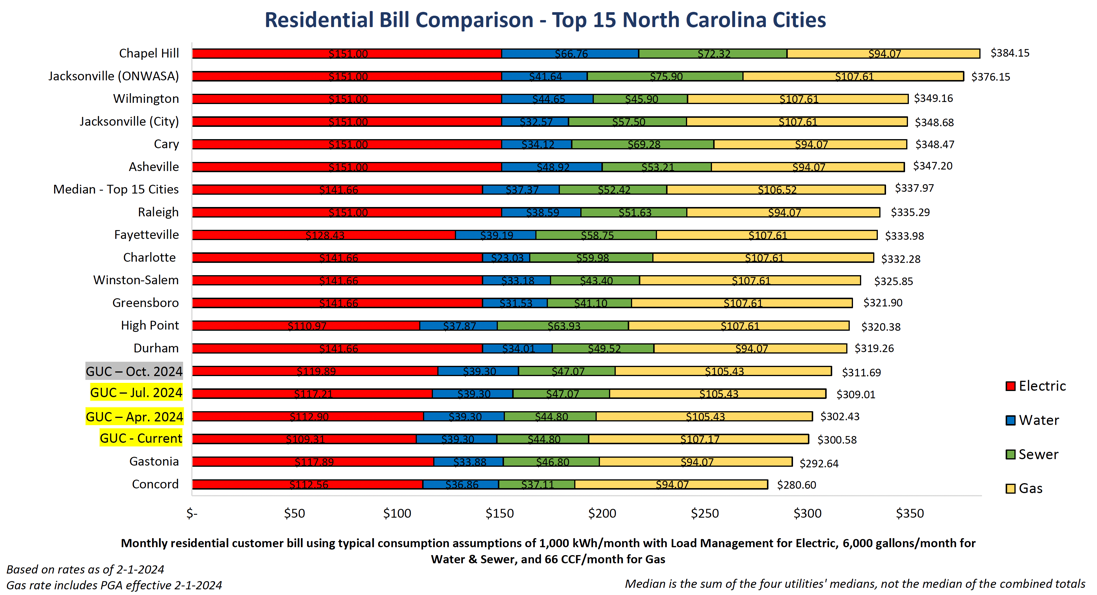FY 2024-25 Budget Proposal Update (April 2024)
GUC works very hard to keep rates as low as possible, even as the cost of providing our utilities continues to rise. Wise budgeting, prioritizing capital investments, improving efficiencies, and managing expenditures have allowed GUC to keep recent rate increases to a minimum – and consistently below projections and forecasts.
Tremendous inflationary pressure over the past few years has now made it impossible to continue providing the safe, reliable utility solutions the Greenville region has come to expect without raising rates.
A summary of the FY 2024-2025 budget proposal includes:
- The need to raise electric rates 3.8% ($4.31 per month for the typical residential customer).
- This is the first regular rate increase since 2013.
- Even with the increase:
- GUC’s electric rates will still be lower than they were 11 years ago.
- GUC will still have the lowest electric rates in Pitt County1.
- GUC’s electric rates will still be the third lowest of the 15 largest NC Cities1.
- The need to raise sewer rates 5.1% ($2.27 per month for the typical residential customer).
- The increase goes towards replacing one clarifier at the Wastewater Treatment Plant that has reached the end of its useful life as well as adding another clarifier to increase our capacity and meet the needs of our growing community.
- This is the first sewer rate increase since 2019.
- There is no change proposed for water and natural gas rates.
- GUC will be turning over $8.6M to the City (a record amount) in lieu of property taxes.
- When compared to the top 15 other cities across the state, GUC’s combined rates for all four utilities will remain among the lowest (3rd lowest of 15) 1.
- This budget establishes an EV Charger rate for the Type 3 – Fast Chargers.
- This encourages charging during off-peak hours,
- Helps offset the impact of the load they place on the grid during peak hours, and
- Does not affect Type 1 & 2 chargers (which are more likely to be at residential homes or complexes).
- This encourages charging during off-peak hours,
GUC Commissioners and employees are members of the community, too, and understand that rate increases can be difficult for some customers and unwelcome by many more in these uncertain economic times. However, considering the cost of living has gone up 32% in the past 10 years while GUC has worked to minimize rate increases, these increases are reasonable. They are also necessary in order for GUC to continue safely providing reliable utility solutions at the lowest reasonable cost in an environmentally responsible manner for our customers now and into the future.
The GUC Board of Commissioners will vote on the budget in June with the Greenville City Council required to approve it that same month before going into effect on July 1, 2024.
1Rates based on typical residential customer using 1,000 kwH/month electricity with load management, 66ccf/month of natural gas, and 6,000 gallons/month for water & sewer.

What Customers Need to Know about Electric Rate Changes (February 2024)
GUC lowered electric rates a total of 14.1% in 2015, 2016, and 2017 as a result of the asset sale to Duke Energy in 2015. Thanks to a five-year plan developed at the time of the sale, there have been no rate increases since 2013 (well beyond the original plan) and rates have remained the same since 2017 (currently, the typical residential customer’s average bill is $109.31).
Duke Energy Progress (DEP), who GUC purchases power from through the North Carolina Eastern Municipal Power Agency (NCEMPA), places a charge or credit on the wholesale power bill each year called a true-up. This allows DEP to recover the actual cost of generating power if it is different from what was projected. Typically, it is close to $1M and NCEMPA will absorb those costs or credits, but the true-up for 2022 is $54M due in part to globally higher than normal natural gas prices. GUC’s portion is roughly $12.7M and is due beginning in April. NCEMPA was able to negotiate paying the true-up over a two-year period. As a result, GUC will be temporarily adding a charge to electric rates to cover the bill and will roll it off automatically when the debt is paid off in two years.
Key Facts:
- GUC came up with a plan in 2015 to use reserves from the asset sale to keep rates stable for 5 years. So far, that has lasted to 9 years, well beyond our promise.
- GUC has consistently charged one of the lowest electric rates around.
- The typical residential customer will pay an average of $3.59 more per month (average bill going from $109.31 to $112.90).
- This temporary increase will still leave GUC’s electric rate 11% lower than 2013.
- When comparing typical residential customers with load management who use 1,000kW per month:
- GUC will still be 25.8% lower than the average of the local Co-Ops ($39.23 difference)
- GUC will still be 18.3% lower than the average local investor-owned utilities ($25.35 difference)
- GUC will still be 12% lower than average of other local public power agencies ($14.96 difference)
- GUC will still have the lowest electric rates in Pitt County.
- In the past 10 years, instead of bills rising 32% with inflation, GUC lowered the electric rate a total of 14.1%.
- If GUC’s electric rate had kept up with inflation the past 10 years, right now customers would be paying 54% more for their electricity than they are.
- On average, that’s nearly $60 more each month for the typical residential customer ($58.58 difference).
